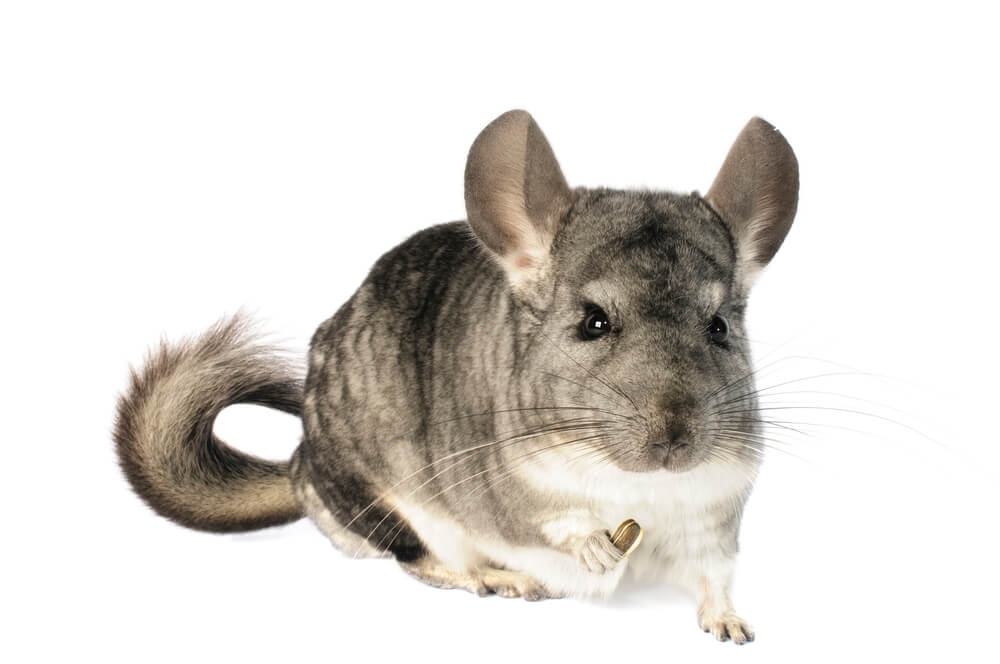Chinchillas are very social and affectionate animals. In the right environment, they are also extremely friendly and playful.
However, if the conditions of their environment aren’t ideal, they can become aggressive.
These tendencies are especially common in captive chinchillas who do not have access to other chinchillas and excessive amounts of human contact.
Chinchillas that are raised in captivity will often go through a period called imprinting where they develop a repulsion towards anything that isn’t a member of their species or their home cage.
Chinchillas will get aggressive when there is an imbalance in the dominance hierarchy within the cage or when the dominant chinchilla feels threatened by the submissive one.
A chinchilla’s aggression can be difficult to spot at first glance as most of it is expressed through passive body language such as leaning on walls instead of jumping off them, running backward instead of forward, and hiding instead of showing themselves.
Chinchillas also tend to sniff each other’s backsides more than usual, which is another indicator that they may be feeling threatened by another chinchilla.
Will a chinchilla bite you?
Females are more likely to bite than males.
If a chinchilla gets aggressive, you should know what you’re up against.
They have powerful jaws and sharp teeth that can cause serious injury if they get close enough. They may also bite through the skin of your finger or toe.
An aggressive chinchilla will often lunge at their target, so ensure you don’t get too close to them when angry.
How do you deal with an aggressive chinchilla?
If you notice any of these behaviors in your chinchilla, it’s best to step in and do something about it.
If the aggressive chinchilla is a male, always use a dominant tone when speaking to them.
Make sure you are in control and not allowing them to be pushed around by anyone else.
The best way to deal with an aggressive chinchilla is to keep as many of its needs met for as long as possible.
Providing plenty of hiding spots, exercise time and food will help them calm down.
Additionally, making sure that the chinchillas have an opportunity to interact with other animals will also help lessen their aggression toward one another.
How do you know when a chinchilla is angry?
One of the most accurate ways to know when a chinchilla is feeling threatened or angry is to watch its body language.
If they are displaying any of the following behaviors, they are likely feeling uncomfortable or threatened: -Laying on their back with legs raised -Leaning against walls -Running backward rather than forwards -Sniffing each other’s butts more than usual -Biting and scratching
How do you calm an angry chinchilla?
If a chinchilla is feeling threatened, it can be helpful to put them in its home cage.
The dominant chinchilla will feel safer and happy to be back in its territory.
This also helps to remind them of their home environment so they aren’t afraid of the new space. You mustn’t handle the chinchilla aggressively or restrain them too much because this will only cause more fear and aggression.
Another way to calm an angry chinchilla is by giving them some attention and affection. When a chinchilla feels loved, they are less likely to lash out at other animals or people.
Chinchillas with aggressive tendencies can also be medicated with tranquilizers provided by your veterinarian or animal care specialist.
How do you know if a chinchilla is happy?
A chinchilla that is content and happy will often have its ears perked up and be alert to its surroundings.
They will also exhibit playful behaviors such as running and jumping around.
Additionally, happy chinchillas will groom themselves frequently and have a healthy coat of fur. If you notice any of these behaviors in your chinchilla, it’s a good indication that they are feeling good!
Conclusion
So, now that you know all about how to tell if your chinchillas are fighting or happy, you can be sure to keep an eye out for any aggressive behavior and deal with it accordingly.
Remember to provide plenty of toys and activities for them to enjoy, as well as interaction with other animals, to help keep them calm and content.
Thanks for reading!














